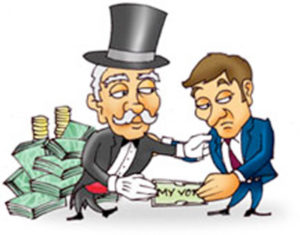 “Comest thou with deep premeditated lines,
“Comest thou with deep premeditated lines,
With written pamphlets studiously devised
Humphrey of Gloucester?”
(King Henry VI part 1, act 3, sc.1)
Comments. In the instance, the bishop of Winchester accuses the duke of Gloucester of using “studiously devised” documentation so as to deprive the bishop of his rights, whatever they may be.
Today, the task of preparing ‘studiously devised’ documents is conducted by the corporation lawyers, a critical component of the lobbying system, along with passing money to sundry politicians for their re-election campaigns. Corporate lawyers are the link between their corporate clients and political candidates.
As documented by William Domhoff in his book “Fat Cats and Democrats”, there are three kind of corporation lawyers, Wall Street Lawyers, Washington lawyers and local lawyers.
Wall Street lawyers translate the transactions of the investment bankers and commercial bankers into “deep premeditated lines”, that is, virtually incomprehensible legalistic language. They deal with the legal aspect of mergers, prepare prospectuses for securities, represent clients before governmental agencies and serve as members of boards of directors.
Washington lawyers are usually men of middle-class origin who arrive in Washington with a Democratic president and stay on after he left to utilize their experience and connections, deriving benefits for themselves and for the fat cats who “contribute” to the political campaigns.
Local lawyers are the handymen for the rich men at the local level.
Given the enormous costs of the presidential election pantomime some people ask themselves what is the purpose of the rich (who are usually also stingy towards the poor) to divest themselves of money that seems to end up literally scattered into the air. After all, elections would occur regardless of contributions.
The answer is two-fold. One, the amount given out, though unthinkable for the common man, is peanuts for the purses of these folks.
And two, campaign contribution is one of the cheapest and yet most rewarding returns on investment. Remember the repeal of Glass-Steagall by the Clinton administration, that opened the gates of roulette investments for commercial banks. Until spoken about in the context of the housing market crisis, probably 99% of the common men did not even know that Glass-Steagall existed, let alone what it was. Meaning that no “common man” could have proposed the idea of removing an act whose purpose (in 1933) was to avoid the events that triggered the Great Depression.
The story of the “deep premeditated lines” that led to the repeal of Glass-Steagall and of who wrote the “studiously devised pamphlets” has yet to be written (and may never will). But we know the class of people who wrote the repeal and the means they used to make it become law. A law that promoted financial crime on an as yet unheard-of scale. Which should also say something about the paradoxical nature of law (or at least of some laws).
Tips for Use. Anticipate your adversary’s move when he shows up with written statements and questionable statistics. Change “Humphrey of Gloucester” to name of adversary, e.g. “Comest thou with deep premeditated lines, with written pamphlets studiously devised, Caruthers of Kalamazoo?”
In the Play. The Bishop of Winchester and Gloucester are enemies and are ready to square out in front of the king.
Image Source. http://www.onepennysheet.com/2009/11/lobbyists-quit-in-record-numbers/
